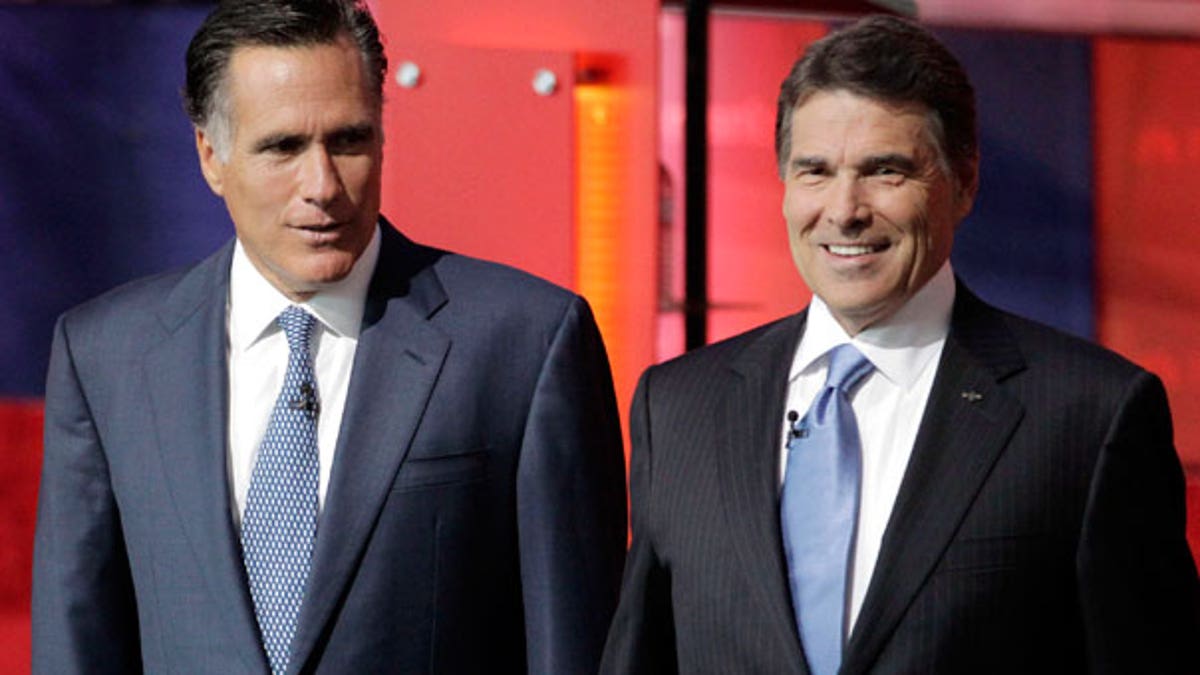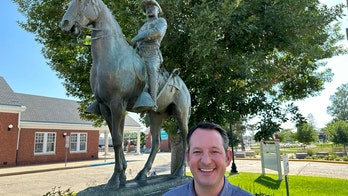
Spet. 7: Republican presidential candidates former Massachusetts Gov. Mitt Romney, left, and Texas Gov. Rick Perry, stand together before a Republican presidential candidate debate at the Reagan Library in Simi Valley, Calif. (AP)
Texas Gov. Rick Perry, at a fundraiser Wednesday in Virginia, confided what he called his “guiding principle” as governor: “Don’t spend all the money.”
Perry’s Principle could apply equally well to the business of campaigning – particularly as Perry aides readily admit they can’t compete with the fundraising power of former Massachusetts Gov. Mitt Romney, Perry’s closest rival for the G.O.P. presidential nomination.
“We don’t think we’ll be able to raise as much as Romney,” a Perry strategist told Fox News in a telephone interview. “But we’re working hard at it, and we’ve got people on our team who’ve raised money for Bush, for McCain, for Rudy Giuliani….The problem is the governor is just not a well-known commodity across the country yet.”
The most recent Federal Election Commission records, reflecting data from the second quarter that ended June 30, show Romney light years ahead of the rest of the Republican pack, with nearly $18.4 million in his campaign war chest. Running a distant second is Texas Rep. Ron Paul who, with his legion of committed followers, has amassed about $4.5 million.
Former Utah Gov. Jon Huntsman – like Romney, a hugely successful businessman, with personal wealth estimated between $16 million and $71 million – is believed to be in third place in the fundraising sweepstakes, with about $4 million raised thus far. Because Huntsman declared his candidacy late, he has not yet had to file his campaign totals, leaving the $4 million estimate the product of published reports.
The same is true for Perry, who declared his candidacy on August 13, and will accordingly have only seven weeks of national fundraising under his belt – not a full quarter – before his campaign is required to post its first numbers with the FEC. Perry aides have set an ambitious goal of $10 million for that period, and believe they will be in the ballpark of that figure.
Across his decade in the governor’s mansion in Austin, and as a recent chair of the Republican Governors Association, Perry has been a powerhouse fundraiser, raking in an estimated $150 million and demonstrating a prowess in the Lone Star State exceeded only by the Bush family.
The average donation to Perry’s last re-election campaign was about $3,000, showing his skill at tapping big donors. Perry aides said they also used the Internet “a lot,” which typically translates into small donations from a greater number of contributors.
“Rick Perry has done a terrific job raising money in Texas, under the Texas campaign finance system,” said Michael E. Toner, a former FEC chairman and general counsel to the Republican National Committee. “You can accept unlimited individual contributions in Texas. You're not limited to the $2,500 limit that exists at the federal level.”
Like many campaign analysts, Toner questioned whether Perry can demonstrate similar fundraising talent outside of his core base in Texas, from which he is expected to garner some $25 million.
“If Gov. Perry raises $10 million to $12 million in this quarter that ends on September 30th, I think that will be a very strong showing. He's just getting into the race, just developing his national fundraising base…But I do think Mitt Romney will raise the most money on the [FEC’s] October 15th report, and that's certainly been his track record in the past.”
One further difference between Romney and Perry is the former’s vast personal wealth, acquired from the many years in the private sector he so often touts on the campaign trail. Past federal filings place Romney’s net worth at, or above, $200 million. Perry’s personal net worth is estimated at $1 million to $3 million – meaning he cannot delve deeply into his own pockets, as Romney conceivably could, for last-minute spending on TV ads, for example.
Perry is required to file his personal financial disclosure forms with the FEC on September 15, but he can seek up to two 45-day extensions.
A campaign aide to Gov. Romney did not respond to a request for comment.




